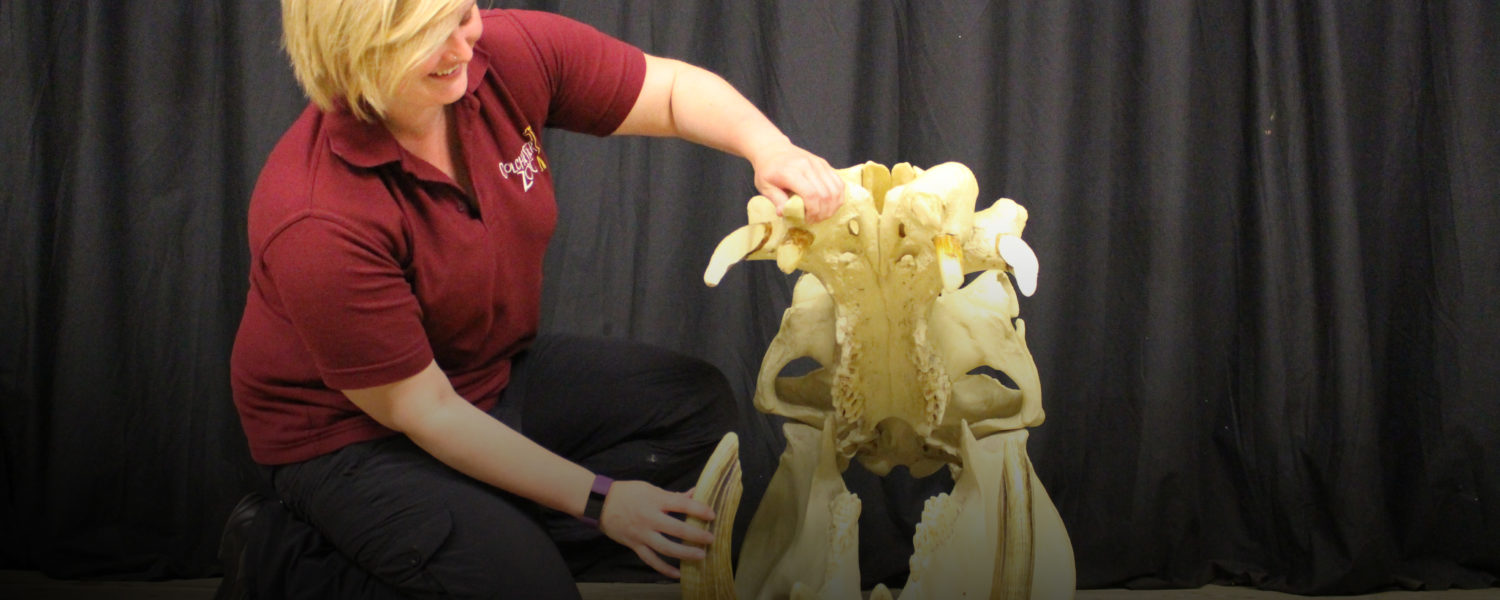These modules are designed for students studying animal care on an FE level course. They provide detailed and specific information and allow access to areas of the zoo not normally available for the public to view.
These modular sessions enable you to get the perfect combination of topics for your animal care course. Choose two modules for a full day trip or if you are just visiting for half a day, book one module. Sessions are for a maximum of 30 participants (students and teachers) , but we can run multiple sessions if you have a larger group.
To book an Animal Care Module please contact our education department directly to discuss availability by phone at 01206 332511, 01206 332512 or 01206 331292 or email education@colchesterzoo.org.
Click on a module for more details.
Modules available:
- Animal Contact
- Animal Diet & Health
- Animal Restraint
- Animal Training
- Enclosure Design
- Enrichment
- Collection Planning
- Role of Zoos
Each module is 2 hours. One hour is spent in a classroom setting providing background information and an introduction to the topic. The other hour is out in the zoo participating in a tailored behind-the-scenes experience.
In order to accommodate these behind-the-scenes experience, there is an associated cost. The cost is £10.00 per post 16 student to attend one session, or £11.00 per post 16 student to attend two sessions on the same day. This fee includes their entry to the zoo. Free teacher supervisory places are provided at a ratio of 1 free teacher per 10 students. There is no minimum number of students but if you are bringing fewer than 10 students, there is a minimum charge of £100 to book a module session.
Sessions only available in September-April (not available in May-Aug). Sessions only available during Essex county council term times (not weekends or during school holidays).
Please note, we can not guarantee which animals will be seen on any specific tour.
Animal Contact
Students discuss the pros and cons of allowing contact with zoo animals. As a group, students learn when we allow contact, and what safety measures we take when contact is allowed. The tour will highlight public contact areas including safety measures, then for a more in-depth look we’ll go behind the scenes to see how contact is managed and controlled for our keepers.
Topics Covered:
- Contact vs non-contact animals
- Safety lines
- Safety gaps and cross bars
- Stand-off barriers
- Public health and safety
- Crush cages
Animal Diet and Health
This session opens with a brief introduction to animal nutrition. The students then learn about different types of food presentation and how this relates to an animal’s diet and feeding regime. The tour involves taking different types of food presentations around to a variety of animals and highlights how different species are fed in different methods. The tour may include a look at our animal kitchen.
Topics Covered:
- Roof feed
- Pole feed
- Scent trail/blood trail
- Scatter feed
- Browse
Animal Restraint
The differences between physical and chemical restraint are explored. This leads into the reasons for restraint and which methods are best in various circumstances. The talk ends with a discussion of how training can be used to avoid restraint. The tour involves examining equipment in enclosures used to restrain animals (e.g. crush cages), as well as equipment used to facilitate training (e.g. training walls).
Topics Covered:
- Physical restraint
- Chemical restraint
- Crush cage
- Non-contact
- Training wall
- Injection training
- Crate training
Animal Training
Students will learn the theory and practical application of animal training and how it relates to animal behaviour. As a starting point, students learn the theory of classical and operant conditioning and the different types of operant conditioning. Building on that, students discover how training is a form of operant conditioning, and how clicker training can be used as positive reinforcement operant conditioning. The tour involves watching real training demonstrations such as injection training, displays training, and target training.
Students may get the chance to attempt to target train animals.
Topics Covered:
- Operant conditioning
- Classical conditioning
- Positive reinforcement
- Clicker training
- Bridge
- Cue
- Training wall
- Target
Enclosure Design
Students will learn all about creating appropriate enclosures for zoo animals. Using examples from the zoo, pupils learn how enclosure design must meet the needs of the keepers, animals, and visitors. The needs of the animals are then explored in more depth with relation to the Five Freedoms and how we ensure proper animal care and welfare. The tour includes the chance to see enclosure features not normally visible to the public such as filter systems, incubation rooms, off-show housing, and dens.
Topics Covered:
- Contact vs non-contact
- UV lighting requirements
- Boilers and heating systems
- Off-show areas
- Crush cages
- Slides and trapdoors
Enrichment
Students learn how we keep our animals entertained. The problems of stereotypical behaviour (abnormal behaviour) and boredom in captive animals is examined. We’ll discuss the purpose of enrichment and the results of a variety of enrichment studies. On the tour, students will get the chance to see a variety of enrichment put in with different animals and note the results.
Topics Covered:
- Enrichment
- Sensory, novelty, physical, social, problem solving enrichment
- Stereotypical behaviour
- Desired result
Collection Planning and Breeding Programmes
Students will learn how zoos decide which animals to keep and which animals to breed. The talk contains a detailed explanation of ESBs and EEPS with a detailed walk through of example studbooks. The tour includes a variety of off-show areas with modifications/considerations needed for breeding groups such as cubing dens, separation stalls, breeding groups and bachelor groups, etc.
Topics Covered:
- ESB and EEP
- Studbook
- AI
- Cubbing den
- Bachelor group vs breeding groups
Role of Zoos
The talk starts with an overview of Colchester Zoo’s mission statement and how we meet this mission statement. The three main points of this are recreation, conservation and education. The tour highlights specific places around the zoo including educational components of enclosures, areas used for research, and how we accommodate our public visitors
Topics Covered:
- Mission statement
- Research
- Education
- Zoos as a recreational site


